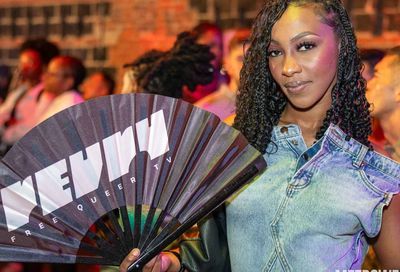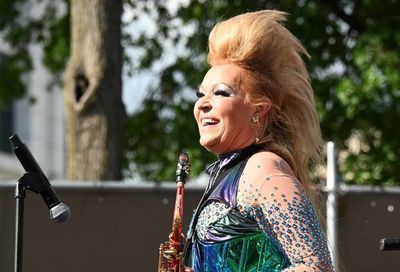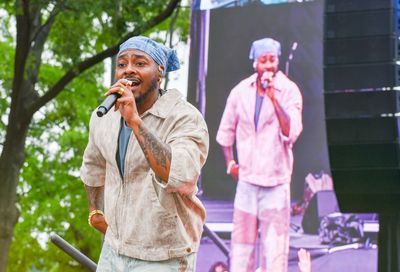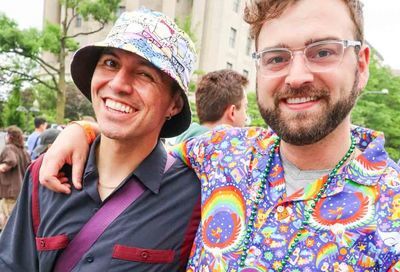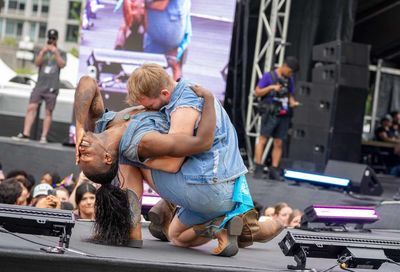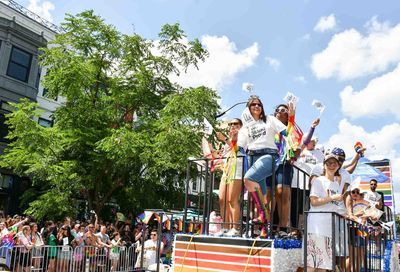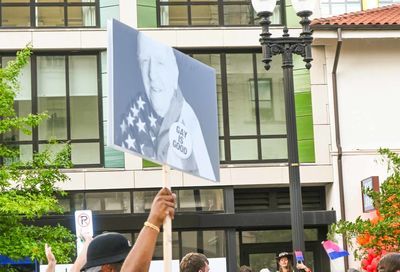Pansy Division
Commentary: Buggery
Hanging around my father’s auto-body shop during my summer vacations wasn’t exactly the same as hanging out with longshoremen or sailors, but I still learned my fair share of salty language from the mechanics, tool vendors, farmers and others who decorated the paint-scented air with their creative uses of profanity.
Not that it was exceptionally strong stuff, particularly by today’s looser standards. These were the pre-cable days when the utterance of ”bitch” on network television would cause nationwide apoplexy.
But the language I did learn was salty enough. ”Bitch” was ubiquitous, though usually in the form of ”son of a bitch,” which was itself often pronounced in the one-word formation, ”summbitch.” ”Hell” was still a slightly dirty word at the time, at least when used outside of a specific biblical context, and so was used frequently. ”Goddamn” and ”bastard” were common as well, but the rarity of ”fuck” taught me that it was best saved for special cursing situations.
Such were the seeds of my grown-up potty mouth.
I heard a lot of other words as well.
Once, when I was in middle school, my father was talking with one of his visitors about a well-known and well-liked local man who, due to a childhood bout with polio, got around with crutches and a specially-outfitted pick-up truck. Dad summed up the hardships he had faced: ”He’s got a poor family, he’s crippled and his brother’s a faggot.”
At that point in time I knew what a faggot was and I was pretty sure I was one, though it was my most desperate and guarded secret. That one summer moment in the shop was the most painful thing my father ever said to me, and he didn’t even mean it to be.
In the late 1970s, faggot wasn’t a dirty word. It wasn’t exactly something you’d toss around in polite society, but the atmosphere was such that it could be used without consequence, especially in places like my rural hometown. It was part of the litany I heard throughout my closeted youth: faggot, queer, pansy, pervert, fruit.
Words, of course, change with time. I came of age as a gay man during the early 1990s, still freshly out of the closet and full of activist fire. At that time ”queer” was undergoing its retrofitting from slur to slogan. Now that the word has become simply an adjectival adjunct to GLBT, it’s easy to forget exactly how big that linguistic battle was.
Many, many gay men and lesbians from the generations before mine argued with great passion that you can’t ”reclaim” a hateful word that you never owned in the first place. For them there was no pride in using a word that carried so much hurt.
Armed with the self-assurance of youth and newfound freedom, it was easy to dismiss such arguments. Queer wasn’t really about reclamation anyway — it was about provocation, goading and prodding straight society on issues of homosexuality. It was about being strong and defiant.
Now it’s just another in a long line of words once shocking, now mundane — words that serve better in headlines and advertising than conversation or political arguments.
All this is to say that language changes, evolves. That’s the beauty of it. Even if the word has been somewhat neutered politically, if someone of my generation or younger — straight or gay — refers to me as a queer, I’m unlikely to bat an eye.
But if a 60-something white guy were to call me a queer, I would have much different — and likely highly profane — reaction.
While language does evolve, some people will always be stuck in the past. That’s why when North Carolina Gov. Mike Easley (D) praised Hillary Clinton as a fighter who would make Rocky Balboa look like ”a pansy,” it highlighted what still remains a generational divide for gay men.
A substantial number of gay bloggers and activists dismissed the remark, declaring that ”pansy” isn’t actually an anti-gay term. An equally substantial number of gay men — I suspect largely my age or older — were surprised at how vociferously some gay men were dismissing the impact of a word which so many of us had experienced as an epithet.
It was surprising to me because we’ve listened for years now to complaints from activists about the use by young people of ”gay” as an all-purpose synonym for ”bad.” I’m not convinced that we should be holding America’s youth to a higher standard than a white, 50-something, Democratic governor of a Southern state who, it could be argued, should know better.
As political controversies go, the pansy flap is why we have the word ”kerfuffle,” a commotion without any substance. Anyone who was deciding their vote between Barack Obama and Hillary Clinton on the basis of this one event probably doesn’t deserve to be voting.
But it does show that we have to be cognizant of the power of our words, and not be too quick to dismiss the fact the some words retain their power to hurt long after they’ve morphed in common usage.
That said, I look forward to the day I turn 65 and some activist whippersnapper tries to explain to me why ”faggot” is a term of endearment.
Sean Bugg loves the fact that language changes, otherwise he would never have a column called ”Buggery.” He blogs at Buggblog.com, available at www.metroweekly.com.
Support Metro Weekly’s Journalism
These are challenging times for news organizations. And yet it’s crucial we stay active and provide vital resources and information to both our local readers and the world. So won’t you please take a moment and consider supporting Metro Weekly with a membership? For as little as $5 a month, you can help ensure Metro Weekly magazine and MetroWeekly.com remain free, viable resources as we provide the best, most diverse, culturally-resonant LGBTQ coverage in both the D.C. region and around the world. Memberships come with exclusive perks and discounts, your own personal digital delivery of each week’s magazine (and an archive), access to our Member's Lounge when it launches this fall, and exclusive members-only items like Metro Weekly Membership Mugs and Tote Bags! Check out all our membership levels here and please join us today!



















